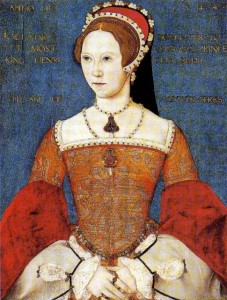 On 22nd June 1536, after two years of ill-treatment and bullying, Mary Tudor, the daughter of Henry VIII and Catherine of Aragon, submitted to her father, accepting him as Supreme Head of the Church in England and accepting the invalidity of her parents' marriage, and, therefore, her illegitimacy.
On 22nd June 1536, after two years of ill-treatment and bullying, Mary Tudor, the daughter of Henry VIII and Catherine of Aragon, submitted to her father, accepting him as Supreme Head of the Church in England and accepting the invalidity of her parents' marriage, and, therefore, her illegitimacy.
Previously, Mary had been defiant in rejecting her demotion from Princess Mary to Lady Mary and in not accepting the annulment of her parents' marriage or the terms of the 1534 First Act of Succession. However, plans for her escape to the Continent led to nothing and her friend and advisor, Eustace Chapuys, the imperial ambassador, feared that Mary would be martyred if she did not submit to the king. Chapuys advised her that she should "consent to her father's wish" if she felt that she was in danger. He reassured her that this was the Emperor's advice.
Poor Mary, it must have felt like a betrayal of her mother and everything she believed in. Her heart must have been heavy as she wrote to the king:
"Moste humbly prostrete before the feete of Your most excellent Majestie, your most homble, faythefull, and obediente subjecte, which hath so extremely offended Your most gratyous Highnes, that my heavie and fearfull hert dare not presume to calle you Father, ne Your Majesty hathe any cause by my desertes, saving the benignetye of your moste blessed nature dothe surmounte all evelles offences and trespasses, and is ever mercyfulle and redy to accepte the penytente callynge for grace, in any convenyente tyme. Havinge receaved this Thursdaye, at nighte, certene letteres from Mr. Secretary, aswell advisyng me to make my homble submyssyone immedyatly to your selfe, which because I durste not, without your gracyous lycence, presume to doe befor, I latly sente unto him, as sygnefyenge that your moste mercyfull harte and fatherly pyttye had graunted me your blessyng, with condissyone that I should persevere in that I had commenced and begoone; and that I should not eftsones offend Your Majesty by the denyall or reffusalle of any suche artycles and commaundementes, as it maye please Your Highenes to addresse unto me, for the perfite triall of myne harte and inward affectyone, for the perfait declaratyon of the bottome of my herte and stomake.
Fyrste, I knowledge my selfe to have most unkyndly and unnaturally offended Your most excellent Highenes, in that I have not submytted myselfe to your moste juste and vertuous lawes; and for myne offence thearin, which I must confesse wear in me a thousand folde more greevous, then they could be in any other lyving creature, I put myselfe holly and entyrely to your gratyous mercy; at whos handes I cannot receave that punishment for the same, that I have deserved.
Secondly, to opene my herte to Your Grace, in theis thinges, which I have heartofore refused to condiscend unto, and have nowe writtene with myne owne hand, sending the same to Your Highenes hearwith; I shall never beseeche Your Grace to have pyttye and compassyon of me, yf ever you shall perceave that I shall prively or appertly, vary or alter from one pece of that I have writtene and subscribed, or refuse to confyrme, ratefy, or declare the same, wher Your Majesty shall appointe me.
Thurdly, as I have and shall, knowinge your excelent learnynge, vertue, wisdome, and knoledge, put my soulle into your directyone; and, by the same, hathe and will, in all thinges, from hence foarthe directe my consyence, so my body I do holly commyte to your mercye and fatherlye pyttye; desiringe no state, no condissyone, nor no mannore degre of lyvinge, but suche as Your Grace shall appoynte unto me; knoledging and confessynge, that my state cane not be so ville, as ether the extremyty of justice wold appoynte unto me, or as myne offences have required and deserved. And what soever Your Grace shall comaunde me to doe, touchinge any of theyse pointes, ethere for thinges paste, presente, or to come, I shall as gladly doe the same, as Your Majestie cane comaund me. Moste homblye, therfor, beseeching your mercy, most gratyous Soveraine Lord and benigne Father, to have pyttye and compassyon of your myserable and sorowfull child; and, with the aboundance of your inestymable goodnes, so to overcome my iniquitie towardes God, Your Grace, and your holle realme, as I maye feele some sensyble tokene of reconsyllyation; which, God is my judge, I onely desyre, without other respect, to whome I shall dayly praye for the preservation of Your Highenes, with the Queenes Grace, and that it may please him to send you issue. From Hownsdon, this Thursdaye, at 11 of the clocke at nighte.
Your Graces moste humble and obedient Daughter and Handmayd,
Marye"
If you are a Tudor Society member, you can find out more about the treatment Mary received at the hands of her father in my Claire Chats video series on the topic. Here are links to parts 1 and 2:
Notes and Sources
- Letters and Papers, Foreign and Domestic, Henry VIII, Volume 11, 7.
- State Papers: King Henry VIII, Volume I, Parts I and II, p.457-458.



I wonder if Mary remembered all those who bullied her when she became Queen and punished them. Does anybody know?
Thank you
Tisha
yeah she did she killed ’em
She wasn’t called Bloody Mary for nothing.
She wasn’t called Bloody Mary at all, that was later propaganda and we really need to move on from this myth today.
Let me ask you these questions based on examples
Henry V was responsible personally for directly ordering the massacre of the innocent civilians in Rouen and for he endangered the starving citizens of Halfour. He also ordered the French prisoners, several hundred to be executed at Agincourt. But by a fluke he is a national hero and not Bloody Henry. Why? Simple….he had better propaganda.
Peter the Great slaughtered thousands of Stelski and executed hundreds more, some himself as well as hundreds of defeated prisoners, many of whom were tortured. Should he be called Great or Bloody?
Henry Viii and Elizabeth I both executed hundreds of so called rebels and hundreds of people for religious beliefs and on the continent thousands died for heretical beliefs in the same period that Mary ruled. Is Francis I called Bloody? Is Elizabeth? Is Henry Viii?
Is Charles V?
Mary I pardoned most of the lovely rebels who tried to kill her in favour of Elizabeth and tried to stop her marriage to Philip who had no authority in England, thanks to her wise marriage treaty, executing the leaders only, as did every other monarch. Mary pardoned those who tried to hijack her throne, all but Northumberland, the architect. She even pardoned Jane Grey’s father who then led another rebellion, this time to kill her. With great reluctance she agreed to execute Jane and her husband, which is a tragedy, but like others she had little choice to keep her realm safe. Yes, she passed laws making heretical beliefs punishable by death, so did every monarchy in Europe and in England since Henry iv. At first she also made certain people were educated and a successful preaching campaign was implemented. You also did not get condemned for a first offence but for a second or third, for serious offences. Most trials of former reformers and people following a wide variety of what we might call new beliefs, including reformed teachings had nothing to do with the Queen. They were prosecuted by local magistrates after being denounced by their neighbours. Some trials were based on nothing but rumours and some magistrates and clergy were over enthusiastic in their actions. When strict procedures were followed more people were released than prosecuted. In at least one recorded case charges were brought out of revenge after they had been found not guilty of something else. In serious cases, the state took its time and in the case of proven heresy people were given every opportunity to recant and many did. This meant reconciliation and life. In the state trials of the leading reformers, the crown had the right to intervene and sometimes did. In the notorious case of Thomas Cranmer, Mary could be accused of wanting to ensure he died, because after many recanted statements and many hearings and changed minds, he made a final statement of reconciliation and submitted and should have been pardoned but his previous guilty verdict for treason stood against him. Mary signed his death warrant and Cranmer was sentenced to burn. It is debatable as to whether it was personal, due to him being responsible for the legislation that turned England towards reform or whether it was to do with his part in the annulment of her parents marriage. Other than this, however, it is unfair to call Mary bloody. Yes, 276 people fell victim to the heresy laws in a short reign of five and a half years, which in England was not usual, but in earlier times fewer people followed these beliefs. Reform had spread since her childhood and even since the reign of her father. England was still primarily a Catholic country and Mary would have been expected by her people to prosecute heresy which was one of the worst crimes you could be accused of. Yes, it was a cruel death and certainly some of the victims gained sympathy and we should be horrified. However, it was not an unusual sight. Sadly burning was a common form of execution, right up to the end of the eighteenth century for a number of crimes. Female traitors could be burned as could wives who killed their husbands. The official punishment for male treason was hanging, drawing and quartering up to the 1800s. Rioting and violence during a protest were punished with hanging. In England witches were hung up to the eighteenth century. In Scotland and Europe they were burnt. It is not excusable to treat people this way for anyone for their religious beliefs, but it was accepted under Mary, Henry, Elizabeth who used hanging, drawing and quartering and even under Edward. Persecution continued under James I and under Oliver Cromwell and even the last Stuart Kings.
Mary Tudor personally intervened to save a number of people condemned to death and pardoned hundreds of rebels on their way to prison. She ended several cruel practices and actually she was being successful in her reign before she died, tragically of cancer. She had made it possible for Elizabeth to be accepted as a female monarch, made the state respected, she reformed the church, expanded trade, reformed the economy and made several social reforms. Mary is also recalled for the loss of Calais, which cost us far too much money to keep anyway right at the end of her reign, but she should also be remembered for a stunning victory at Saint Quinten the previous year. It was Mary, not Elizabeth who first said she was married to England and that her people were her children. Her reputation was hijacked by her successor and by the propaganda of John Fox and we have been stuck with it ever since.
Did Mary deserve this? No. Did she forgive those who bullied her? Yes, actually, she did, because most of them were actually acting as directed and treated her with honour once she was back at Court. In spite of him being behind her mistreatment and banishment Mary reconciliation with her family saw her have a healthy relationship with Henry afterwards as well.
Thank you. So much, I am glad to see that you don’t idolise Elizabeth and I thank you for your kindhearted words. No one should have to be targeted for supporting their favourite Monarch. I am a supporter of Mary I and she has been my favourite monarch and I will be supporting her until I die. It makes my heart melt to see that others have come out and supported Mary I like I do. I thank you for your kind words.
Thank you. So much, I am glad to see that you don’t idolise Elizabeth and I thank you for your kindhearted words. No one should have to be targeted for supporting their favourite Monarch. I am a supporter of Mary I and she has been my favourite monarch and I will be supporting her until I die. It makes my heart melt to see that others have come out and supported Mary I like I do. I thank you for your kind words.
I would like to see a campaign set up to have Mary’s remains moved to Peterborough as it was her dying wish. She was about to be excommunicated by the pope so I think England would have become a country tolerant of most religions.